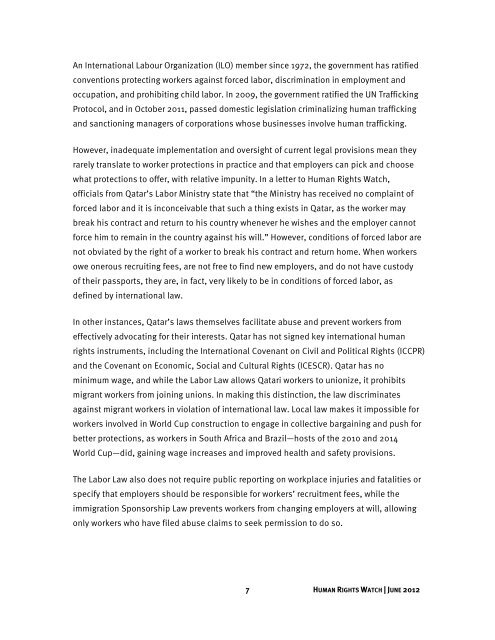Download the full report - Human Rights Watch
Download the full report - Human Rights Watch
Download the full report - Human Rights Watch
Create successful ePaper yourself
Turn your PDF publications into a flip-book with our unique Google optimized e-Paper software.
An International Labour Organization (ILO) member since 1972, <strong>the</strong> government has ratified<br />
conventions protecting workers against forced labor, discrimination in employment and<br />
occupation, and prohibiting child labor. In 2009, <strong>the</strong> government ratified <strong>the</strong> UN Trafficking<br />
Protocol, and in October 2011, passed domestic legislation criminalizing human trafficking<br />
and sanctioning managers of corporations whose businesses involve human trafficking.<br />
However, inadequate implementation and oversight of current legal provisions mean <strong>the</strong>y<br />
rarely translate to worker protections in practice and that employers can pick and choose<br />
what protections to offer, with relative impunity. In a letter to <strong>Human</strong> <strong>Rights</strong> <strong>Watch</strong>,<br />
officials from Qatar’s Labor Ministry state that “<strong>the</strong> Ministry has received no complaint of<br />
forced labor and it is inconceivable that such a thing exists in Qatar, as <strong>the</strong> worker may<br />
break his contract and return to his country whenever he wishes and <strong>the</strong> employer cannot<br />
force him to remain in <strong>the</strong> country against his will.” However, conditions of forced labor are<br />
not obviated by <strong>the</strong> right of a worker to break his contract and return home. When workers<br />
owe onerous recruiting fees, are not free to find new employers, and do not have custody<br />
of <strong>the</strong>ir passports, <strong>the</strong>y are, in fact, very likely to be in conditions of forced labor, as<br />
defined by international law.<br />
In o<strong>the</strong>r instances, Qatar’s laws <strong>the</strong>mselves facilitate abuse and prevent workers from<br />
effectively advocating for <strong>the</strong>ir interests. Qatar has not signed key international human<br />
rights instruments, including <strong>the</strong> International Covenant on Civil and Political <strong>Rights</strong> (ICCPR)<br />
and <strong>the</strong> Covenant on Economic, Social and Cultural <strong>Rights</strong> (ICESCR). Qatar has no<br />
minimum wage, and while <strong>the</strong> Labor Law allows Qatari workers to unionize, it prohibits<br />
migrant workers from joining unions. In making this distinction, <strong>the</strong> law discriminates<br />
against migrant workers in violation of international law. Local law makes it impossible for<br />
workers involved in World Cup construction to engage in collective bargaining and push for<br />
better protections, as workers in South Africa and Brazil—hosts of <strong>the</strong> 2010 and 2014<br />
World Cup—did, gaining wage increases and improved health and safety provisions.<br />
The Labor Law also does not require public <strong>report</strong>ing on workplace injuries and fatalities or<br />
specify that employers should be responsible for workers’ recruitment fees, while <strong>the</strong><br />
immigration Sponsorship Law prevents workers from changing employers at will, allowing<br />
only workers who have filed abuse claims to seek permission to do so.<br />
7 HUMAN RIGHTS WATCH | JUNE 2012

















